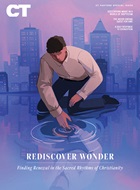On the first weekend in October I attended the National Storytelling Festival in Jonesborough, the oldest town in Tennessee. The next weekend I attended the annual meeting of the Evangelical Homiletics Society, which was held this year at Moody Bible Institute in Chicago. Storytellers one weekend, homileticians the next. It wasn't exactly whiplash but it did leave a crick in my neck.
Most folks don't realize that there are professional storytellers, men and women who stand on a bare platform and wrap their audiences in tall tales or folk tales, in stories of cowboys, crazy families, or wise animals. One woman told us of the romance of Lou Gehrig and his wife. Others regaled us with cowboy poetry, the story of Dracula, and folk tales from Japan illustrated with origami. Another drew us into an adventure of a boy and a mailman on a heavy bike gone brakeless, hurtling down a hill toward a curve they'd never make. (Don't you wish you'd heard it?) We sat in huge tents in rapt attention. Sometimes we walked out still chuckling and other times dabbing at our eyes.
The homiletics conference wasn't quite like that.
You could tell just from the conference theme, "Hermeneutics for Homiletics." One weekend was going to be a lot more entertaining than the other. It's hard for papers on speech act theory, vivacity, or the pulpit rebuke to go head-to-head with a good yarn. Yet having them face off in my mind was valuable.
Many of the storytellers we heard were, as they say, "spiritual." They believe that truth speaks out of ancient lore and legends, myths and memories, no matter how outrageous or fanciful. But incredibly, we heard not one Bible story. We heard good stories, but no good news. I often wonder what would happen if they let someone simply get up and tell the story of the Prodigal Son. No preaching, no dressing it up in modern clothes or extended details. Just tell the story the way Jesus did, and sit down to leave the two brothers and their father looking at us from the edge of the party. But I didn't hear anything like that there.
Most stories at the festival had a kind of elasticity about them. They were agreeable and friendly, open-minded and flexible. No one ever walks out red-faced. One man told a dark fairy tale. At one point he interrupted himself to ask us, "Which ending do you want—the German ending, the Russian, or the Chinese?" You don't get that with the homileticians. They were positively prickly about getting to the text's one message.
Preachers could learn a lot from superb storytellers. For one thing, they neither ramble nor rush. They don't explain everything. They trust their audience to "get it." They paint better pictures than most of us and they know what makes people feel a story. They have practiced. They own their stories. They use even the most common words well.
Good tellers trust their stories. Most evangelical preachers trust their explanations of stories. We preachers have a perilous penchant for short-changing Bible stories the way a parent tries to hit the high points of a bedtime story so he can get back to what he was doing. That's why our speaker at the homiletics conference drove home the necessity of seeking out and weighing the specific words and phrases God gave us in the Bible, especially in the stories, lest we miss his point.
One thing I noticed about the storytellers: they are almost always better than preachers at capturing humanness. A lot of good stories make us sympathize with the characters, no matter who they are or where they come from. You hear a good story and you think, "I know just what you mean." Good stories are like echoes.
But what those storytellers did not do was give me a sense of God. Never once did I think, "So that is what God is like!" Never once did I hear a holiness story, or a home story worthy of heaven. That is what homileticians do. We who study and practice preaching are only worth our salt if we let the Bible speak clearly.
On Sunday mornings at the Storytelling Festival they set aside a session for "Sacred Telling." It was a vapid attempt. Not all that sacred, to tell you the truth. No one would ever feel the need to take off their shoes. Godly homileticians know about Isaiah and his hot coal. The tellers I've heard in years past know "spiritual" stories but they don't really know God. They're free to talk of spirits and gods and whole worlds of ancestors, but they do not tell the stories of God as revealed in Christ and Scripture. For that, people must still listen to a preacher who can tell them "the old, old story of Jesus and his love."
Lee Eclov is pastor of Village Church of Lincolnshire, Illinois, and the author of Pastoral Graces: Reflections on the Care of Souls (Moody).
Copyright © 2014 by the author or Christianity Today/Leadership Journal.
Click here for reprint information on Leadership Journal.

Support Our Work
Subscribe to CT for less than $4.25/month

























